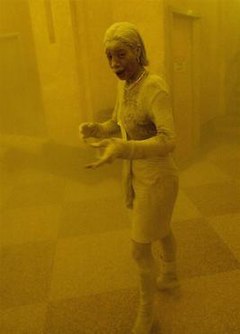Marcy Borders: Difference between revisions
George Swan (talk | contribs) (infobox) |
George Swan (talk | contribs) (add image) |
||
| Line 13: | Line 13: | ||
| occupation = bank clerk | | occupation = bank clerk | ||
}} | }} | ||
[[File:Marcy Borders.jpg | thumb | left | 240px | [[Stan Honda]]'s photo of Borders, immediately after the World Trade Center collapse, has been very widely republished.]] | |||
'''Marcy Borders''' was a bank clerk, who worked in the region of the [[World Trade Centre]], who survived its collapse, following [[al Qaeda]] attacks on [[September 11, 2001]].<ref name=TorStar2015-08-26/> | '''Marcy Borders''' was a bank clerk, who worked in the region of the [[World Trade Centre]], who survived its collapse, following [[al Qaeda]] attacks on [[September 11, 2001]].<ref name=TorStar2015-08-26/> | ||
[[Stan Honda]], a photographer for [[Agence France Presse]], captured an image of Borders, completely covered in dust from the building collapse, that subsequently became widely described as ''"iconic"''.<ref name=UsaToday2015-08-26/> | [[Stan Honda]], a photographer for [[Agence France Presse]], captured an image of Borders, completely covered in dust from the building collapse, that subsequently became widely described as ''"iconic"''.<ref name=UsaToday2015-08-26/> | ||
Revision as of 20:13, 31 August 2022
| Marcy Borders | |
|---|---|
| Other names | the dust lady |
| Born | 1973-07-19 |
| Died | 2015-08-24 New Jersey |
| Occupation | bank clerk |
| Known for | A photo of Borders, covered in dust from the WTC collapse, was very widely republished |

Marcy Borders was a bank clerk, who worked in the region of the World Trade Centre, who survived its collapse, following al Qaeda attacks on September 11, 2001.[1] Stan Honda, a photographer for Agence France Presse, captured an image of Borders, completely covered in dust from the building collapse, that subsequently became widely described as "iconic".[2] The image became so well-known and so widely distributed, that Borders became known as "the dust lady".
Personal impact
Borders had only been working at the World Trade Centre for four weeks, prior to the attack.[3] According to the "The Routledge Companion to UK Counter-Terrorism", Borders said that she never recovered from the trauma of the attack. Depression lead to a break-up from her partner, losing custody of her children, and several addictions.
Borders said that a key event in her recovery and return to sobriety was learning of the death of Osama bin Laden.[4]
The Telegraph reported that Borders had preserved the outfit she wore in the iconic photo, without removing any of the dust.[4]
Cultural impact
The image Honda took of Borders was iconic she was remembered in retrospective articles about the attacks of 9/11.[4] The Telegraph chose her as one of the survivors they profiled on the tenth anniversary of the attack. The Telegraph reported that Borders had been invited to spend the tenth anniversay of 9/11 at a memorial event in Germany.
Cancer diagnosis and death
Borders was diagnosed with stomach cancer in August 2014.[5]
By November 2014 the Jersey Journal reported that Borders's cancer had already saddled her with a crippling debt of $190,000 -- even though she had not yet received surgery and she still needed additional chemotherapy.[5] The Jersey Journal reported that Borders said she could not even afford to get her prescriptions filled.
Borders died from cancer on August 24, 2015.[6][7][8] Borders believed her cancer was triggered by the toxic dust she was exposed to when the WTC collapsed. Her death was very widely reported.
In fiction
Borders and Sharbat Gula are the two main characters of Pamela j. Booker's 2009 play "Dust: Murmurs and a play".[9] Both Borders and Gula first became known to the public through iconic photos. Booker dedicated her play to Borders and Gula.
References
- ↑ J. Freedom du Lac. ’Dust Lady’ Marcy Borders, featured in haunting Sept. 11 photo, dies of cancer: Before she died, Marcy Borders wondered whether her cancer was related to Sept. 11., Toronto Star, 2015-08-26. Retrieved on 2015-08-26. “She was 28 at the time, and Honda’s haunting photo of her — distributed worldwide by Agence France-Presse — became one of the most iconic images of that horrifying day.”
- ↑ Andrew Card. Iconic 911 photos where they now?, USA Today, 2015-08-26. Retrieved on 2015-08-26. “Marcy Borders, the "dust lady" photographed in the aftermath of 9/11, died recently from stomach cancer. USA TODAY Network looks at the current lives of other individuals captured in seminal photos from that time.”
- ↑ Andrew Staniforth, Fraser Sampson (2012). The Routledge Companion to UK Counter-Terrorism. Routledge. ISBN 9781136254291. Retrieved on 2015-08-26.
- ↑ 4.0 4.1 4.2 Philip Sherwell. 9:11 the people in the pictures, The Telegraph (UK), 2011-09-05. Retrieved on 2015-08-26. “Her ghostly image is one of the most enduring from 9/11, though Marcy Borders, then a 28-year-old bank worker, does not even recall it being taken. Around the world, “the dust lady” was seen as the face of survival and escape from the hell of the Twin Towers.”
- ↑ 5.0 5.1 Jonathon Lin. 911 survivor 'dust lady' faces a new demon: Stomach cancer, The Jersey Journal, 2014-11-27. Retrieved on 2015-01.
- ↑ Joel Christie, Jeff Maysh. The 'dust lady' of 9/11 dies: Iconic survivor Marcy Borders, 42, succumbs to stomach cancer which she blamed on ash from the Twin Towers attack, Daily Mail (UK), 2015-08-26. Retrieved on 2015-08-26.
- ↑ Dust Lady Dies: Woman whose image was closely associated with 9/11 attacks has died, U.S. News & World Report, 2015-08-26. Retrieved on 2015-08-26.
- ↑ Rose Troup Bucnanan. 'Dust Lady' of 9/11 Marcy Borders dies from stomach cancer, The Independent (UK), 2015-08-26. Retrieved on 2015-08-26.
- ↑ Pamela Booker (2009). Dust: Murmurs and a play. Lulu.com. ISBN 9780615190235. Retrieved on 2015-08-26.